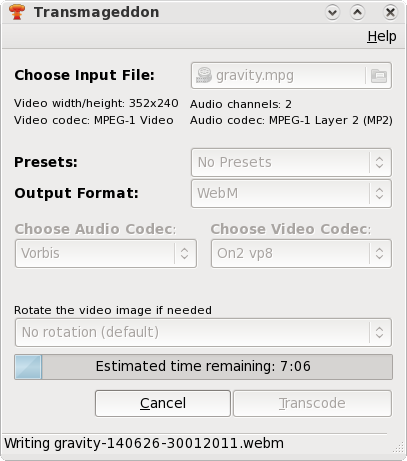Been preparing Transmageddon for adding a slew of new features, biggest visible change so far is replacing the radiobuttons with drop down lists. People suggested I do that from day one, but with the new features planned it has become a necessity, should also make Transmageddon nicer to use on small screens, like netbooks.
Monthly Archives: January 2011
Transmageddon website offline
Just thought I let people know that my personal domain, linuxrising.org is offline atm,. due to a mess up when transferring the domain to a new registrar. This means my gnome.org email is out of comission atm, and that the Transmageddon website is down. Hope to get the situation sorted within a few days.
Back on Transmageddon and new GStreamer features
Been working on Transmageddon again this weekend as the work Edward has been doing on GES has been making its way into GStreamer-plugins-base and gst-python. The most import change for now is the new discoverer service. For those who used gst-python you might know the old version of it, which is basically an API for getting information about a multimedia file. Unfortunately the old Python version had some shortcomings, but thanks to the work that has been done for GES and Rygel we now have a new C based on in plugins-base which works a lot better. So those who had problems with Transmageddon in the past not recognizing files and thus not operating properly should now have more luck. Also the new discoverer process will tell me if a file is interlaced so I can easily now add support for deinterlacing in Transmageddon.
Anyway, I thought I share my half-done implementation of gst-discover in Python. You find a better version in C in gst-plugins-base/tools or a nice Vala version at live.gnome.org. But if you are familiar with Python the code below should at least give you an inkling on how to use the API from Python. Or check out the code of transmageddon for how to use the asynch version of the API.
#!/usr/bin/env python
# gst-python
import os
import sys
import pygtk
pygtk.require('2.0')
import gobject
gobject.threads_init()
import pygst
pygst.require('0.10')
import gst
import gst.pbutils
class discover:
def __init__(self):
self.audiostreams=[]
def set_file(self,file):
self.file_uri=("file://"+filepath)
newitem = gst.pbutils.Discoverer(50000000000)
self.info = newitem.discover_uri(self.file_uri)
self.streaminfo=self.info.get_stream_info()
self.duration= (self.info.get_duration()/1000000000.0)
self.container = self.streaminfo.get_caps()
seekbool = self.info.get_seekable()
if seekbool is True:
self.seekable="Yes"
else:
self.seekable="No"
audiostreamcounter=-1
for i in self.info.get_stream_list():
audiostreamcounter=audiostreamcounter+1
if isinstance(i, gst.pbutils.DiscovererAudioInfo):
audiocaps=i.get_caps()
self.audiostreams.append(gst.pbutils.get_codec_description(audiocaps))
self.audiotags=i.get_tags()
if isinstance(i, gst.pbutils.DiscovererVideoInfo):
self.videocaps=i.get_caps()
self.videotags=i.get_tags()
interlacedbool = i.is_interlaced()
if interlacedbool is True:
self.interlaced ="Yes"
else:
self.interlaced="No"
self.videoheight=i.get_height()
self.videowidth=i.get_width()
def create_report(self): # Create properties report
print "Analyzing " + str(self.file_uri)
print "Topology:"
print " container: " + gst.pbutils.get_codec_description(self.container)
beancounter=0
for item in self.audiostreams:
beancounter=beancounter+1
print " audio stream " +str(beancounter) + ": " + self.audiostreams[beancounter-1]
print " video stream: " + gst.pbutils.get_codec_description(self.videocaps)
print " "
print "Properties:"
print " Duration: " + str(self.duration)
print " Seekable: " + str(self.seekable)
print " Video interlaced: " + str(self.interlaced)
print " Video height: " + str(self.videoheight)
print " Video width: " + str(self.videowidth)
print " Audio Tags: "
audiofile_tags = {}
for akey in self.audiotags.keys():
audiofile_tags[akey] = self.audiotags[akey]
print " " + akey, '\t', self.audiotags[akey]
print " Video Tags: "
videofile_tags = {}
for vkey in self.videotags.keys():
videofile_tags[vkey] = self.videotags[vkey]
print " " + vkey, '\t', self.videotags[vkey]
if __name__=="__main__":
if len(sys.argv)>1:
file = sys.argv[1]
pwd = os.getcwd()
filepath = os.path.join(pwd,file)
discovering = discover()
discovering.set_file(file)
discovering.create_report()
else:
print "select an audio file"
This program should give you an output like this one:
python newdiscoverer.py /home/cschalle/Videos/diracpromo.vob
Analyzing file:///home/cschalle/Videos/diracpromo.vob
Topology:
container: MPEG-2 System Stream
audio stream 1: MPEG-1 Layer 2 (MP2)
video stream: MPEG-2 Video
Properties:
Duration: 735.672
Seekable: Yes
Video interlaced: No
Video height: 576
Video width: 720
Audio Tags:
audio-codec MPEG 1 Audio, Layer 2
bitrate 384000
has-crc True
channel-mode stereo
Video Tags:
bitrate 8000000
GStreamer Conference 2011
Discovered today that the cat is out of the bag and that it is now public that we will be co-locating the GStreamer Conference 2011 together with LinuxCon Europe, The Linux Kernel Summit and ELC-Europe in Prague this year. So set aside some days in October because this is a Linux and open source mega event you do not want to miss :)
Will be doing a more formal announcement in the coming weeks, along with getting a website set up for this years conference. I hope to see everyone who came to the GStreamer Conference in Cambridge last year and a whole lot of new faces at this years event! For those who missed last years event, know that some of the videos and most of the slides are available on the 2010 GStreamer conference website.

